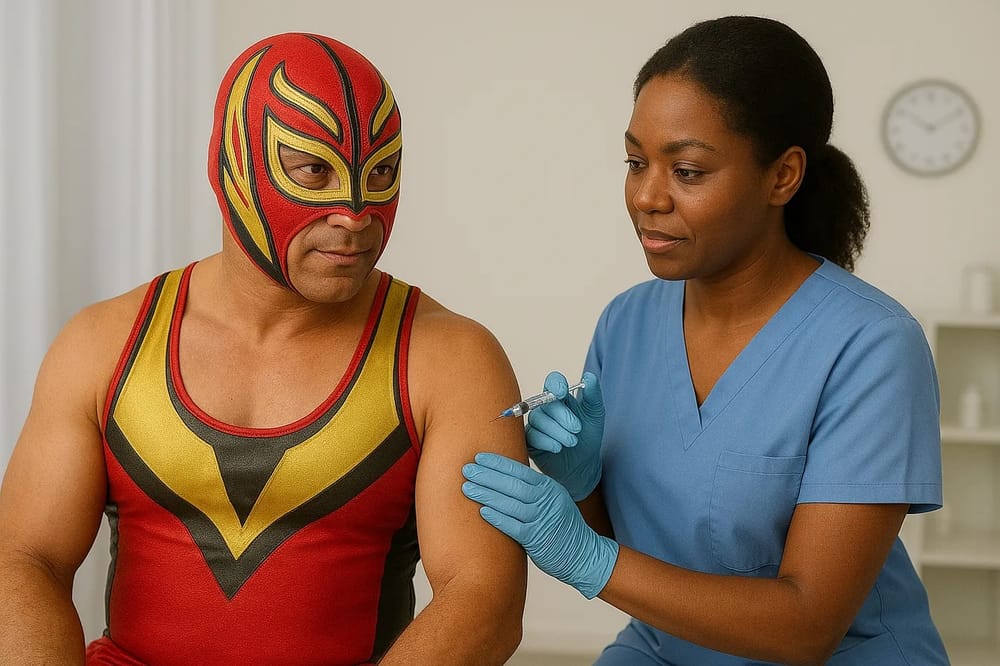When I was a sophomore at Ohio State, I knew several upperclassmen who couldn’t get enough of WWF wrestling events.
It was 1989. Hulk Hogan, Jake “The Snake” Roberts, Randy Savage, The Million Dollar Man Ted DiBiase and his bodyguard Virgil were practically superheroes for fans.
Most people understood the WWF (now WWE) was a choreographed spectacle, part circus, part soap opera.
But a die-hard group swore it was all real.
“You don’t get it,” they’d insist. “Sure, some of it is drama, but they’re actually fighting. None of this is scripted.”
I’d rewind the tapes, point out how wrestlers stomped the mat with their boots to mimic impact, or slapped their own chests to create the sound of a hit that never landed. Didn’t matter. They weren’t budging.
No amount of proof could dent their belief.
Of course, there was no real consequence to clinging to that fantasy. At the end of the day, who cares if someone thinks Hulk Hogan was really body-slamming giants every weekend?
But when we treat science the same way, where evidence and expertise no longer matters, we’re no longer talking about costumes and stage lights.
We’re talking about life and death.
Scientists dedicate decades to mastering their fields. They slog through organic chemistry and physics. They spend nights in labs running controlled studies, then send their work off for peer review, where other experts tear it apart before it ever sees daylight.
Do they always get it right? Of course not. Science evolves. Biases get exposed. Hypotheses are overturned. Treatments improve. That’s the whole point.
It’s the reason antibiotics weren’t available in the 1700s but save millions today. It’s why nobody had an iPhone in 1845. Science advances, and we advance with it.
It’s not only okay to ask questions, it’s necessary. Push back. Demand clarity. Ask for better studies. That’s how knowledge grows.
But there’s a line between questioning in good faith and dismissing expertise altogether because a meme on Instagram said polio vaccines are secretly harmful. Then we ignore those same vaccines eradicated the dangerous crippling disease in the U.S. long ago.
It’s not okay to take medical advice from people with no training, or from influencers who just got back from a Costa Rica retreat and now believe cannabis oil cures cancer. I knew someone who bought into that narrative. She had stage 3 breast cancer. Instead of pursuing treatment with a 65–75% survival rate, she relied on “natural” cures and then died.
We don’t treat other areas of life this way.
When our child breaks a leg, we don’t consult a Reddit thread. We go to the ER. When our HVAC system dies in the middle of summer, we don’t wing it with duct tape and good intentions. We call an expert. If mold spreads through our basement, we don’t just light incense and hope for the best. We get professional remediation.
Yet when it comes to our health and our children, some of us are willing to toss aside science for whatever pops up on Facebook, TikTok, or in a podcast.
I’m all for questioning.
Ask why our food has more unpronounceable chemicals than anywhere else. Ask why autism rates have risen. Ask why peanut allergies suddenly exploded in schools. Ask why nutrition isn’t a larger part of medical school. None of those questions should be off-limits. And yes, common sense matters too.
But wholesale discarding science? That’s a deadly gamble.
Until this year, the U.S. hadn’t seen a measles death in over a decade. Now, three unvaccinated children are gone because their parents followed anti-vaccine activists like RFK Jr. instead of pediatricians. Imagine burying your child because someone on YouTube convinced you science was fake.
As with most things, multiple truths can coexist. We can respect science while demanding it keep improving. We can honor experts while still asking hard questions.
But until those questions are answered, let’s not risk lives in the meantime. Social media is not a substitute for years of research. And unlike professional wrestling, the stakes couldn’t be higher.
This post originally appeared on Medium and is edited and republished with author's permission. Read more of Jeffrey Kass' work on Medium.
